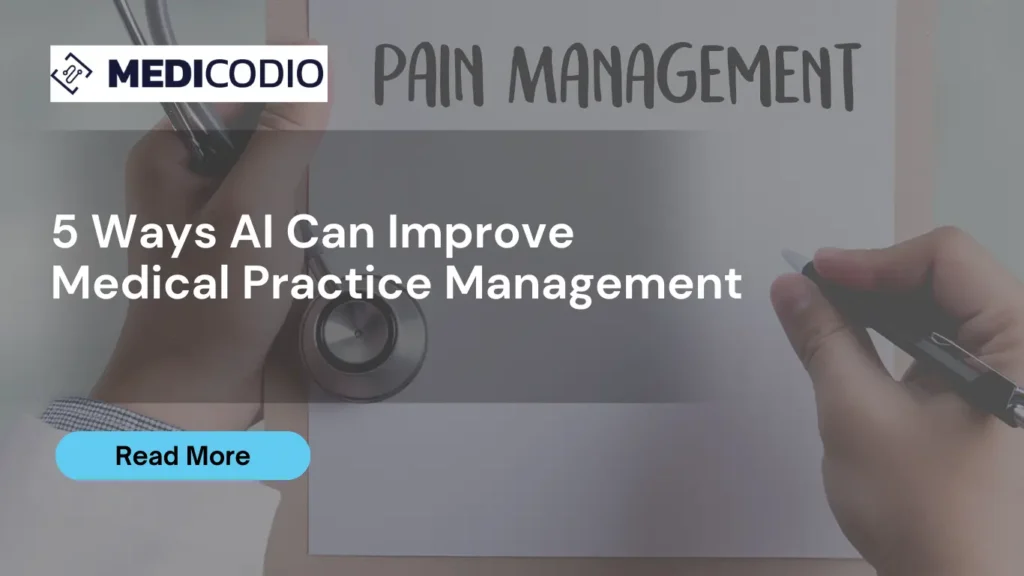Medical practice management is known for running healthcare administrative tasks, such as scheduling appointments, medical coding, and billing, and managing patient records, as well as strategic and other operational tasks. The overall objective of practice management is to streamline the administrative process and enhance the revenue and efficiency of a healthcare facility.
With the advancement of technologies like Artificial Intelligence (AI), healthcare practice management is witnessing a rapid transformation. From streamlining administrative tasks to enhancing patient care, AI has shown remarkable potential to revolutionize how medical practices operate efficiently.
Here are five significant ways in which AI is transforming Medical Practice Management.
Before jumping in, let’s understand:
What are the major challenges present in practice management?
The constant changes in healthcare policies and regulations add layers of complexity in the practice management. Navigating the complex landscape of coding, billing, insurance claims, and revenue cycle management demands acute attention to detail.
Managing a medical practice encompasses numerous challenges and navigating the complexities of medical coding and billing stands as one of the foremost concerns. Accurate medical coding is pivotal, ensuring that procedures, diagnoses, and services are appropriately documented to facilitate billing. However, the evolving landscape of coding guidelines and frequent updates to regulatory requirements often pose a significant hurdle. Keeping up with these changes demands constant education and training for staff members, ensuring they remain adept in applying the correct codes and adhering to compliance standards.
Billing intricacies further compound these challenges. Streamlining the billing process while reconciling various payer requirements and addressing claim denials demands a meticulous approach. Delays or errors in billing can directly impact revenue streams, affecting the financial health of the practice. Balancing the efficient collection of payments from diverse sources, such as insurance companies and patients, while staying abreast of evolving reimbursement models, like value-based care, adds another layer of complexity. Thus, achieving a harmonious integration of coding accuracy and efficient billing processes remains a perpetual challenge in practice management, necessitating continuous vigilance and adaptation.
Let’s now look at how AI can help improve practice management.
-
- Automating Administrative Tasks for Efficiency
In the realm of Medical Practice Management, AI-powered systems alleviate the burden of repetitive administrative tasks. Through Natural Language Processing (NLP) and Machine Learning algorithms, AI enables automated scheduling, coding and billing, and documentation. By implementing AI-driven tools, medical practices witness reduced human errors, streamlined workflows, and improved operational efficiency. This not only saves time but also allows staff to focus on more critical aspects of patient care.
-
- Enhanced Decision-Making with Predictive Analytics
AI empowers medical practice managers with predictive analytics tools that analyze vast amounts of data to foresee trends and outcomes. Machine Learning algorithms can identify patterns in patient populations, predict potential no-shows, and anticipate equipment maintenance needs. This proactive approach aids in optimizing resource allocation, staff scheduling, and inventory management, resulting in cost savings and improved patient satisfaction.
-
- Personalized Patient Care and Engagement
AI technologies contribute significantly to enhancing patient care by enabling personalized experiences. AI-driven systems analyze patient data, including medical history, symptoms, and demographics, to generate personalized treatment plans and recommendations. Chatbots and virtual assistants powered by AI provide 24/7 support, answering patient queries and offering guidance, ultimately leading to improved patient engagement and satisfaction.
-
- Efficient Revenue Cycle Management
Managing the revenue cycle efficiently is crucial for the financial health of medical practices. AI-driven solutions assist in optimizing revenue cycle management by identifying coding errors, improving claims processing accuracy, and reducing claim denials. Through AI’s ability to detect patterns and anomalies in billing and coding, medical practices can ensure compliance, accelerate reimbursement cycles, and mitigate financial risks.
-
- Improved Healthcare Operational Efficiency
AI facilitates predictive maintenance in healthcare equipment, ensuring the smooth functioning of medical devices and reducing downtime. Additionally, AI-powered analytics help in optimizing staff allocation based on the patient influx, minimizing wait times and enhancing the overall patient experience. Moreover, AI aids in inventory management by predicting demand, preventing shortages, and reducing wastage.
Conclusion
The integration of AI in Medical Practice Management holds immense promise for healthcare institutions. By automating tasks, enabling data-driven decision-making, personalizing patient care, optimizing revenue cycles, and enhancing operational efficiency, AI is reshaping the landscape of healthcare management. Embracing AI technologies equips medical practices to provide higher-quality care while improving operational effectiveness in an increasingly complex healthcare environment.
If you are interested in exploring CODIO, an AI-based medical coding tool, please schedule a free demo.





